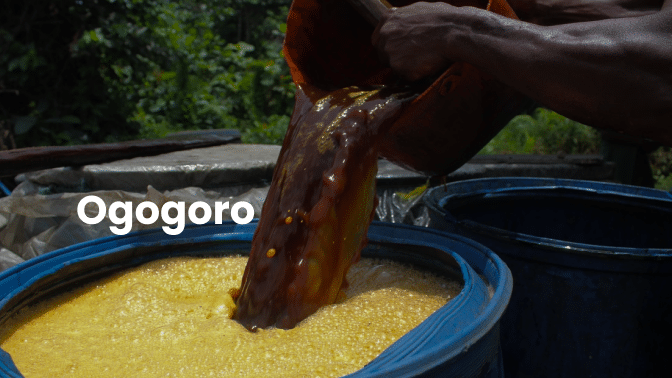Ogogoro is a traditional alcoholic beverage that has been enjoyed in Nigeria for generations. It is made from the sap of the palm tree and is known for its high alcohol content and unique taste. In this blog post, we will take a closer look at the history, production, cultural significance, and future of ogogoro.
Definition of Ogogoro
Ogogoro is a type of alcoholic drink that is made from the sap of the palm tree. The sap is collected and fermented to produce a potent alcoholic beverage with a distinct flavor. The alcohol content of ogogoro can vary, but it is typically around 40-60% ABV.
History and Origin of Ogogoro
Ogogoro has been a part of Nigerian culture for centuries, with roots tracing back to the country’s indigenous communities. It is believed that the palm tree, which is a staple of the Nigerian landscape, was first used to produce ogogoro by local communities as a way to preserve the sap for later consumption. Over time, the production of ogogoro became a cultural tradition, passed down from generation to generation.
Popular Regions Where Ogogoro is Consumed
Ogogoro is widely consumed throughout Nigeria, with the highest consumption taking place in rural areas. It is also popular in urban areas, where it is often consumed in bars and nightclubs. Ogogoro is especially popular in the South-South and South-East regions of Nigeria, where the palm tree is abundant.
How Ogogoro is Made and the Ingredients Used
The production of ogogoro involves tapping the palm tree to collect the sap, which is then fermented to produce the alcohol. The sap is collected in a container and left to ferment for several days, during which time it will turn into ogogoro. No other ingredients are added to the ogogoro, making it a pure and natural drink.
Health Effects of Consuming Ogogoro
Consuming ogogoro can affect your health in both good and bad ways. On the plus side, ogogoro is thought to increase vitality and elevate happiness. However, consuming too much ogogoro can result in alcohol intoxication as well as other adverse health impacts, including liver injury and impaired brain function. Ogogoro should be consumed in restraint, and one should be aware of any possible health dangers.
Read Also: Is Almond Milk Good for Diabetics? A Comprehensive Analysis
Positive Effects of Consuming Ogogoro:
- Boosted energy levels: Ogogoro is known to provide a quick energy boost, making it a popular drink among those looking for a pick-me-up.
- Improved mood: Consuming ogogoro has been known to improve mood and reduce stress, making it a popular drink for socializing and celebration.
- Cultural significance: Ogogoro is a deeply ingrained part of Nigerian culture and is often consumed at social gatherings and special events.
Negative Effects of Consuming Ogogoro:
- Alcohol poisoning: Ogogoro has a high alcohol content, and excessive consumption can lead to alcohol poisoning.
- Liver damage: Regular consumption of ogogoro can cause liver damage, leading to serious health problems.
- Decreased cognitive function: Excessive consumption of ogogoro can impair cognitive function and lead to memory loss and other cognitive difficulties.
- Safety concerns: The unregulated production of ogogoro can result in contamination, leading to potential health risks for consumers.
- Addiction: Like any alcoholic beverage, ogogoro can lead to addiction and dependence, causing significant harm to an individual’s health and relationships.
Cultural Significance of Ogogoro in Various Communities
Ogogoro is a deeply ingrained part of Nigerian culture and has a significant place in many communities. It is often consumed at social gatherings and is used to celebrate special occasions. In some communities, ogogoro is also used as a form of currency and is exchanged between friends and family.
Differences Between Ogogoro and Other Alcoholic Drinks
Ogogoro is unique in that it is made from the sap of the palm tree and has a distinctive flavor that sets it apart from other alcoholic drinks. It is also typically stronger than other alcoholic beverages, with an alcohol content that can range from 40-60% ABV.
Safety Concerns and Regulation Surrounding Ogogoro Production and Consumption
The safety of ogogoro has been questioned due to the lack of regulation surrounding its manufacturing and consumption in Nigeria. The ogogoro could become contaminated during production, endangering the health of those who consume it.
In some instances of illegal production, the ogogoro is strengthened with a toxic substance to increase its potency. To address these safety concerns, there have been calls for the government to regulate ogogoro utilisation and production. This might involve establishing production standards and ensuring that only hygienic and secure ogogoro is provided to clients.
Economic Impact of Ogogoro Production and Consumption
The economics of Nigeria is significantly impacted by the production and usage of ogogoro. For many towns, the palm tree is a significant source of revenue, and many people are employed in the ogogoro industry. In addition, the selling of ogogoro in taverns and parties produces income for these establishments and benefits the economy as a whole.
The Future of Ogogoro and Its Place in Society
Ogogoro is a well-liked and well-known intoxicating beverage in Nigeria despite the safety worries and regulatory difficulties it faces. It is probable that ogogoro output and usage will change as the nation develops further. Ogogoro could gain popularity and acceptance in Nigerian culture with appropriate control and secure manufacturing methods.
Conclusion
Ogogoro is a unique and culturally significant alcoholic beverage in Nigeria, with a rich history and bright future. While it is important to address the safety concerns surrounding its production and consumption, ogogoro will continue to be a beloved drink for generations to come.
